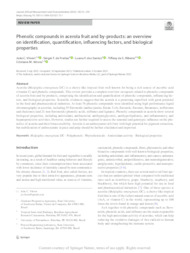Phenolic compounds in acerola fruit and by-products: an overview on identification, quantification, influencing factors, and biological properties.
Phenolic compounds in acerola fruit and by-products: an overview on identification, quantification, influencing factors, and biological properties.
Author(s): VILVERT, J. C.; FREITAS, S. T. de; SANTOS, L. F. dos; RIBEIRO. T. da S.; VELOSO, C. M.
Summary: Acerola (Malpighia emarginata DC) is a cherry-like tropical fruit well-known for being a rich source of ascorbic acid (vitamin C) and phenolic compounds. This review provides a complete overview on aspects related to phenolic compounds of acerola fruit and by-products, comprising the identification and quantification of phenolic compounds, influencing fac- tors, and biological properties. Scientific evidences suggest that the acerola is a promising superfruit with great potential in the food and pharmaceutical industries. At least 76 phenolic compounds were identified using high performance liquid chromatography in acerolas, including 55 flavonoids (anthocyanins, flavan-3-ols, flavonols, flavones, flavanones, isoflavones and chalcones) and 21 non-flavonoids (phenolic acids, stilbenes and lignans). Phenolic compounds in acerola show several biological properties, including antioxidant, antibacterial, antihyperglycemic, antihyperlipidemic, anti-inflammatory, and hepatoprotective activities. However, studies are further required to assess the seasonal and genotypic influence on the phenolics of acerola and their bioaccessibility. Acerola is an anthocyanin-rich fruit with high potential for pigment extraction, but stabilization of anthocyanins in juice and pulp should be further elucidated and improved.
Publication year: 2024
Types of publication: Journal article
Unit: Embrapa Semi-arid Region
Observation
Some of Embrapa's publications are published as ePub files. To read them, use or download one of the following free software options to your computer or mobile device. Android: Google Play Books; IOS: iBooks; Windows and Linux: Calibre.
Access other publications
Access the Agricultural Research Database (BDPA) to consult Embrapa's full library collection and records.
Visit Embrapa Bookstore to purchase books and other publications sold by Embrapa.

